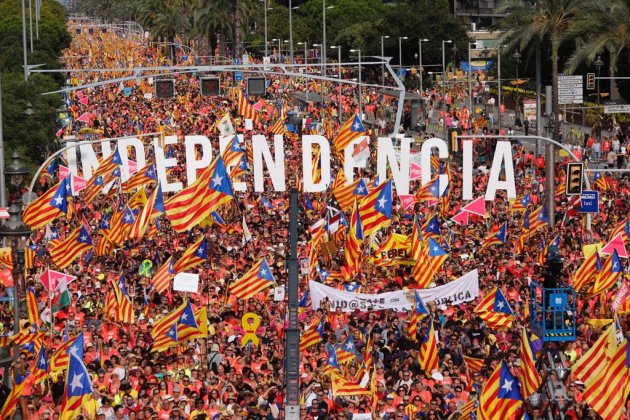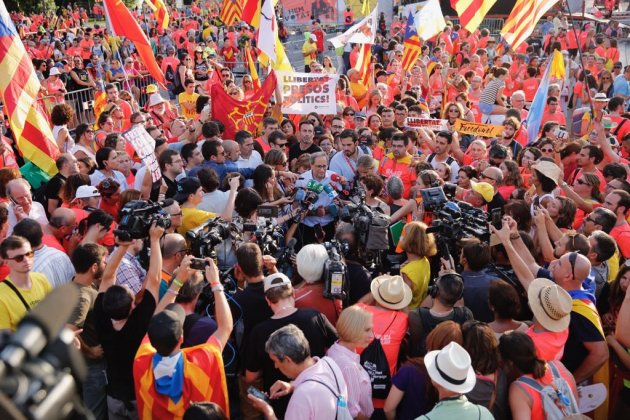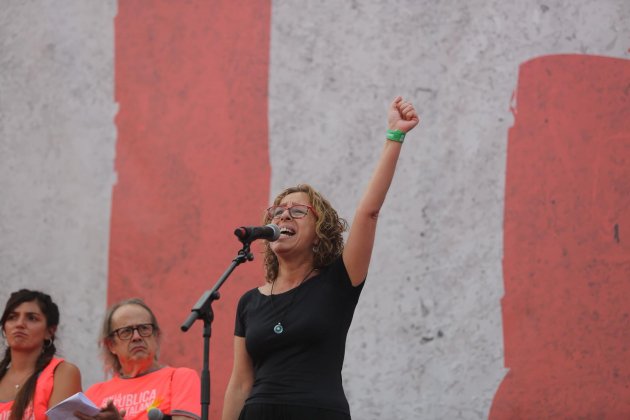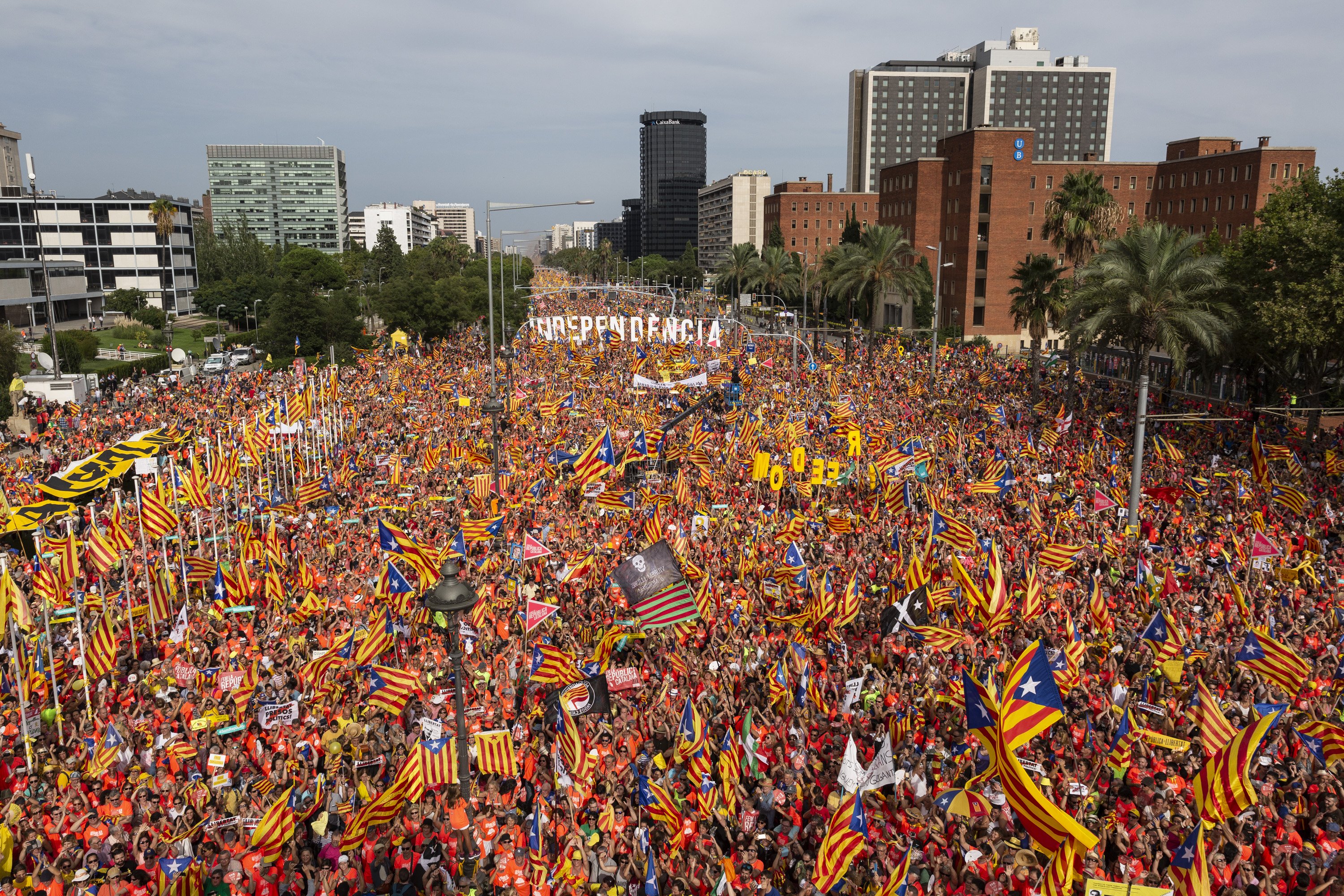“We are not here for everything to stay the same. We are here to build the Republic”. These words opened the addresses to the one million people who had come to give the Catalan independence movement's response after almost a year of repression from the Spanish state. Once again, the streets of Barcelona were full to overflowing with many, many thousands of demonstrators; one million people, according to Barcelona police. It was the first commemoration of Catalonia's national day, the Diada, in a state where some independence leaders were now held as political prisoners and others were in exile, and the organizers wanted to clarify that, despite everything, there was "only one option open: to carry on”. Tuesday's demonstration of pro-independence strength was a loud call for the release of the political and social leaders targeted for repression. But it also sounded a warning for the Catalan political parties.
This was the message offered by Elisenda Paluzie, head of the organising group Catalan National Assemnly (ANC), who called on the pro-independence political forces to prioritize “collective interest over that of the parties”, asking the Catalan government to reflect on the mistakes made and the elements missing, in order to prepare for a new democratic contention, in which they should "not try to say now all the things that the people have to do from the street”. “We all have to do that”, she said.

When the march began, Barcelona's Avinguda Diagonal had already spent several hours converted into a human river with a coral-red colour, the colour of the t-shirts which had been chosen to recall the coral-red ties that sealed Catalan ballot boxes on 1st October. Listening to Paluzie's address in row Zero were Catalan president Quim Torra, other members of the Government, parliamentary speaker Roger Torrent, and a very broad representation of the pro-independence parties.
"Don't throw away what we have achieved"
"We ask for those in exile to act together and to detail an organization that will sustain the republic proclaimed on 27th October, we ask you not to throw away what we have achieved, the victories that we have achieved, especially on 1st October: don't say now that that was not a referendum”, stated the ANC president, recalling that the independence movement had won a self-determination referendum and two consecutive elections: “We are not in 2012 and even less so in 2006”.
“We also ask you to treat us like adults. We are very conscious of the difficulties, the obstacles, the severity of the repression and we don't ask you for the impossible, but we do demand rigour, honesty and determination,” she said.
Sense of state and unity
The president of pro-independence civil group Òmnium Cultural, Marcel Mauri, focused his speech on a warning to the pro-independence political groups, calling on them to maintain unity: “We ask our politicians to have a sense of state and unity, which does not mean uniformity, because it is through this, unity, that we have always moved our country forward”. "We cannot fail, we will not fail”, he asserted, even though he admitted that it “will not be easy or quick”, but he called for “courage and collective self-esteem”.
“Achieving independence depends on us”, said actors from the stage, reiterating the calls of the ANC in performances between the speeches.
Reponse from Torra
Once the act had finished, the president of Catalonia replied to the civil groups in a brief statement in which he framed the Diada mobilization in the content of the march for civil, social and national rights that he has called for to defend the right to self-determination. "They have spoken very clearly and they have every right to demand that the politicians see it through until the end, and we will do so, because this current situation cannot continue. Every day that the prisoners continue in jail is a day of infamy for this country”, he said.

The official part of the rally began at 1714h, as usual - due to the symbolism of the year 1714, when Catalonia had its institutions abolished and its culture oppressed by the Spanish state. This time, the arrival of the symbolic time triggered a "sound wave" - a chant carried by voices up the 6 kilometres of the Avinguda Diagonal from Plaça de les Glories to the uptown Palau Reial, where a symbolic "wall" had been installed which the independence movement had to knock down (in video above).
The top of a large truck served as the stage on which speeches were given, and this year key addresses were given by the lawyers working for the international defence of the prisoners as well as relatives of the members of the CDR (Committees for Defence of the Referendum) group now investigated and pursued for alleged crimes.

Photo: Carles Palacio
“We will never get used to this, such injustice, such brutality, such shame!”, exclaimed Núria Tarrés, the mother of Adri, the young CDR member accused of terrorism who has just gone into exile. Tarrés recounted that the combination of fear and pain is crushing, and that is what the opponents want”. "They win when they inject us with the poison of fear and make us stop, demobilize us”, she said, asserting that Adri and second CDR member Tamara had been targeted as scapegoats. Chants of "We are not afraid" and "Not a single step back" were the response of those listening.
The lawyers leading the international cases against Spain's repression also offered powerful messages of support to the independence movement. Human rights expert Ben Emmerson asserted that "this time next year, Catalonia will be an independent republic" and that the United Nations will support the claims of the prisoners and of all those who wanted to vote on 1st October.
In the name of Foreign Friends of Catalonia, Thomas Schulze made a call "to create the republic right now". "Don't stop!" he insisted.
Scottish lawyer Aamer Anwar, responsible for the defence of exiled minister Clara Ponsatí, gave a strong criticism of the Pedro Sánchez-led Spanish government, saying that the dictator Franco would be proud of modern Spain and accusing it of "state terrorism" in its policy of holding prisoners and not opening up dialogue with the Catalan government. "Don't be afraid," he advised. "By resisting and standing our ground, we will win and Catalonia will be a republic."

